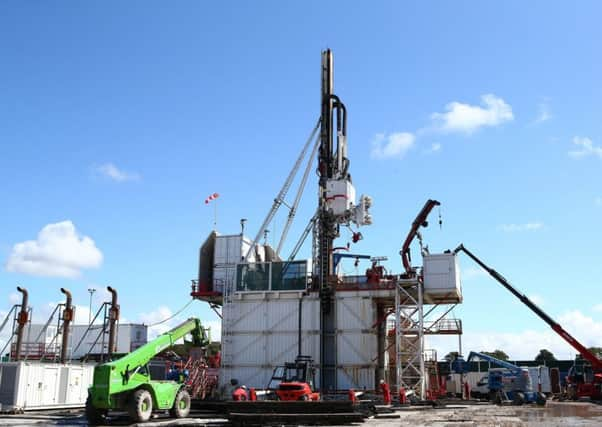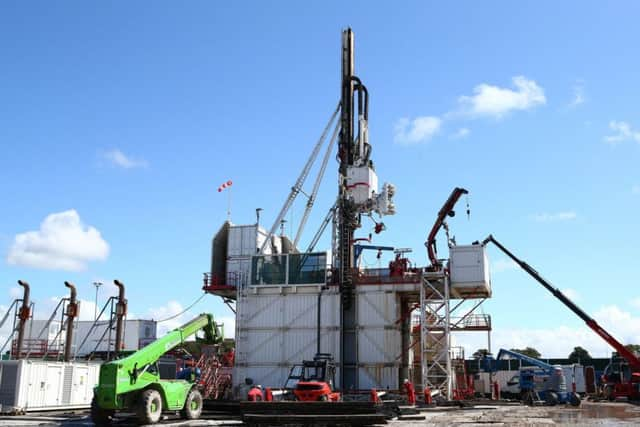Tom Peterkin: When is a fracking ban not a ban? When it's in court


“Fracking is being banned in Scotland, end of story. There will be no fracking in Scotland. I don’t think that position could be any clearer.”
So said Nicola Sturgeon at First Minister’s Questions in October last year. Compare and contrast those words with a statement made by the Scottish Government’s lawyer James Mure QC this week.
Advertisement
Hide AdAdvertisement
Hide Ad“The concept of an effective ban is a gloss,” said the QC. “It is the language of a press statement. What they (Scottish ministers) have done is to announce a preferred position on the issue. They have not yet adopted a position. Any position which the government will take has to undergo an environmental and strategic assessment.”


He added: “The court should therefore allow the policy-making process to go to finalisation which is expected in October this year.”
Mr Mure’s remarks were made as he acted for the government on the first day of a judicial review at the Court of Session, which is dealing with a challenge to the “ban” from the petrochemical giant Ineos.
From Mr Mure’s explanation of the government’s position, it would appear previous ministerial pronouncements on fracking bans are as hollow as an unconventional gas extraction pipeline.
It’s a wonder that Mr Mure’s comments have not triggered a black gold rush in central Scotland. So far, legions of roughnecks armed with hydraulic fracking gear have yet to descend on the Forth Valley to exploit the shale gas trapped beneath.
The absence of boreholes being sunk in back gardens did not prevent a political outcry over the apparent contradiction between what Ms Sturgeon had said in public and what Mr Mure had said in court. Labour’s Claudia Beamish – a doughty campaigner for outlawing fracking – called for an urgent explanation. While Alex Burnett of the Tories – who favour fracking – said the episode showed how ill thought out the ban was.
It was with some glee yesterday that the Tories contrasted Mr Mure’s words with a series of seemingly unequivocal statements made by Ms Sturgeon and others suggesting fracking was banned.
As well as the First Minister, the Tory list included several statements by the energy minister Paul Wheelhouse, a claim published on the Scottish Government website and an SNP party political broadcast.
Advertisement
Hide AdAdvertisement
Hide AdMeanwhile, some observers noted the irony that it took the Scottish Government’s own lawyer to contradict the First Minister when attempting to defend the “ban” from a pro-fracking challenge.
Asked to explain the discrepancy between the Scottish ministers’ statements on the ban and the position outlined by their lawyer, the Scottish Government simply said it had made its preferred position clear on fracking, adding that it would be inappropriate to comment further during the judicial review process.
The SNP was more forthcoming when it came to countering the Tory suggestions that the Scottish Government was guilty of making “seemingly misleading” statements. In a nutshell, the SNP’s argument was that if it was the case that fracking was not actually outlawed, why on earth had Ineos bothered to take legal action against a ban?
Even so, describing one of the SNP administration’s key policies as a “gloss” or “the language of a press release” adds fuel to the fire of those who argue that the ban has been more spin than substance.
Aside from any legal technicalities, the confusion over fracking stance generated in the Court of Session can be seen as typifying the Government’s approach to the issue.
To those in favour of fracking, there has always been the suspicion that the announcement of a ban was a populist decision to please environmental campaigners and the voters who live above the shale oil deposits.
The SNP says that the government has taken an evidence-based approach and point out that the ban was supported by parliament. On the pro-fracking side, however, there is bemusement that non-conventional gas extraction and its promise of thousands of Scottish jobs have not been pursued.
At a time when the future of the North Sea oil industry is not nearly as secure as it once was and conventional fossil fuels are in decline, it seems strange that Scotland should turn its back on developing new energy technology.
Advertisement
Hide AdAdvertisement
Hide AdWith Ineos running a massive site at Grangemouth, including a crude oil refinery (in addition to its petrochemical plant), the technology is on our doorstep.
But frustrated by the Scottish Government’s attitude towards fracking, Ineos has pulled its fracking operation out of Scotland and is concentrating on developing English sites.
However, arguably the most incongruous aspect of the fracking saga is that the Scottish Government argued against it on the grounds that it would damage the environment and undermine targets to reduce carbon emissions, while at the same time shipments of shale gas, fracked in the United States, are arriving in Scotland to be processed at Grangemouth.
Ineos has said the fracked gas is essential for the future of the Grangemouth plant and the jobs it supports. So it would appear US fracked gas can be treated in Scotland, but not Scottish fracked gas – surely a contrary stance to rival the differing interpretations of the fracking ban advanced by the Scottish Government and its lawyer.
